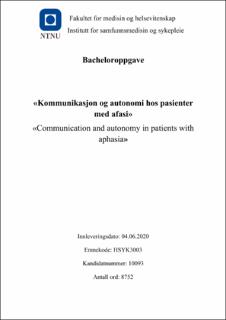| dc.contributor.advisor | Nakrem, Sigrid | |
| dc.contributor.author | Olaisen, Helene Mathea | |
| dc.date.accessioned | 2020-07-23T16:00:32Z | |
| dc.date.available | 2020-07-23T16:00:32Z | |
| dc.date.issued | 2020 | |
| dc.identifier.uri | https://hdl.handle.net/11250/2670051 | |
| dc.description.abstract | Tittel: Kommunikasjon og autonomi hos pasienter med afasi.
Hensikt: Å belyse viktigheten av å ivareta autonomi hos pasienter med afasi og hvordan kommunikasjon påvirker dette.
Problemstilling: Hvordan kan sykepleier ivareta autonomi hos pasienter med afasi gjennom kommunikasjon?
Metode: Litteraturstudie som inneholder kvantitative og kvalitative forskningsartikler. Temaet for oppgaven er selvvalgt på bakgrunn av erfaring og interesse.
Resultat: Slagpasienter med afasi blir ofte utelatt fra inkludering og informasjon om behandling og omsorg rundt egen helse. Dette svekker retten til selvbestemmelse og fører til at helsehjelpen blir dårligere. Sykepleiere omgås pasienten i slagavdeling/tidlig rehabilitering mest, og blir derfor det helsepersonellet som har best tilgang for å tilrettelegge for at pasienten skal få kommunisert sine ønsker og behov.
Konklusjon: Ved tilrettelegging av kommunikasjon kan en opprettholde autonomi hos pasienten. Ved bruk av fysiske kommunikasjonshjelpemidler og sykepleierens strategiske verbale og nonverbale kommunikasjon, kan pasienten inkluderes i beslutninger om hans helse. Sykepleiers plikt er å tilrettelegge for at pasienten som er samtykkekompetent får tale sin egen sak, fremfor å bruke pårørende som fullmakt. Pasientens autonomi vil på denne måten bevares, da kommunikasjon er tilrettelagt. | |
| dc.description.abstract | Title: Communication and autonomy in patients with aphasia.
Purpose: To illustrate the importance of maintaining autonomy in patients with aphasia and how communication affects this.
Problem: How can a nurse maintain the autonomy of patients with aphasia through communication?
Method: Literature study containing quantitative and qualitative research articles. The theme of the thesis is self-chosen based on experience and interest.
Outcome: Stroke patients with aphasia are often excluded from being included and informed about treatment and care regarding their health. This weakens the patients rights regarding autonomy and leads to poorer health care. Nurses are the group of healthcare workers that deals the most with stroke patients in hospitals and early rehabilitation. The nurses therefore becomes the health care professionals who has the best access to arrange for patient participation, information and communication.
Conclusion: Facilitating communication can maintain autonomy in patients. By using physical communication tools and strategic verbal and nonverbal communication, patients can be included in decisions about their own health. The nurse's duty is to arrange for patient participation with the patient that is competent to give concent, rather than using relatives as a spokesman for the patient. If comunication is facilitated, the patient's autonomy will be preserved. | |
| dc.publisher | NTNU | |
| dc.title | Kommunikasjon og autonomi hos pasienter med afasi. | |
| dc.type | Bachelor thesis | |
